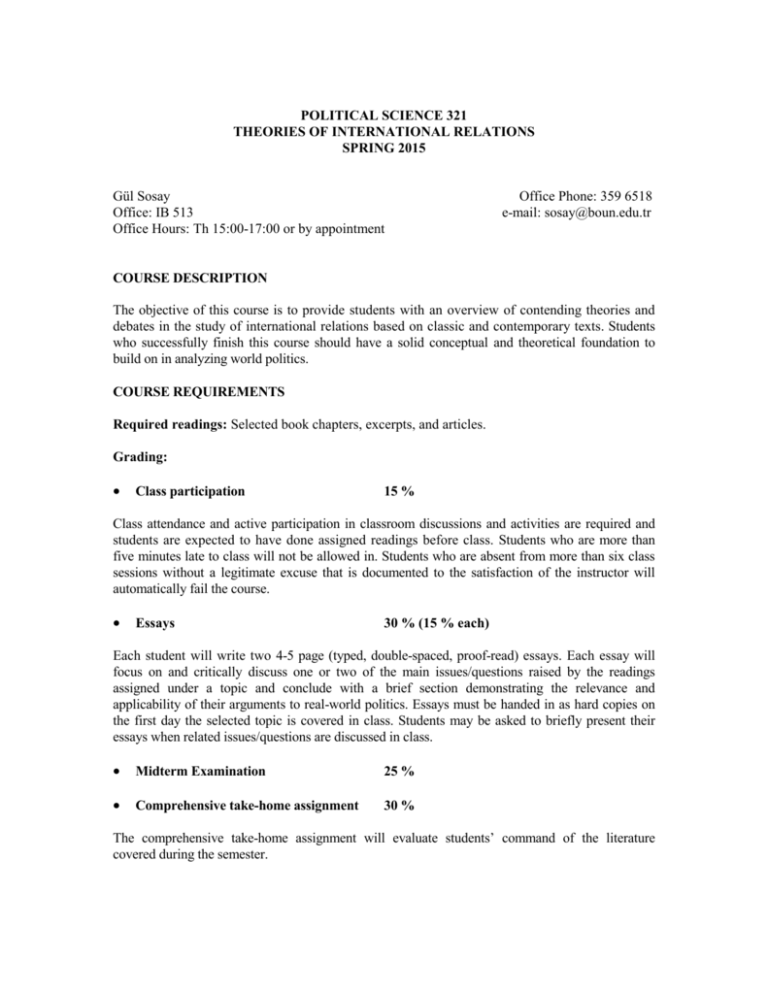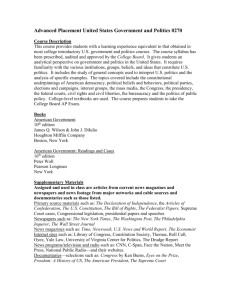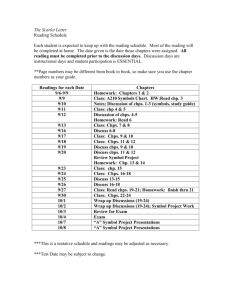321Sp15 - Department of Political Science and International
advertisement

POLITICAL SCIENCE 321 THEORIES OF INTERNATIONAL RELATIONS SPRING 2015 Gül Sosay Office: IB 513 Office Hours: Th 15:00-17:00 or by appointment Office Phone: 359 6518 e-mail: sosay@boun.edu.tr COURSE DESCRIPTION The objective of this course is to provide students with an overview of contending theories and debates in the study of international relations based on classic and contemporary texts. Students who successfully finish this course should have a solid conceptual and theoretical foundation to build on in analyzing world politics. COURSE REQUIREMENTS Required readings: Selected book chapters, excerpts, and articles. Grading: Class participation 15 % Class attendance and active participation in classroom discussions and activities are required and students are expected to have done assigned readings before class. Students who are more than five minutes late to class will not be allowed in. Students who are absent from more than six class sessions without a legitimate excuse that is documented to the satisfaction of the instructor will automatically fail the course. Essays 30 % (15 % each) Each student will write two 4-5 page (typed, double-spaced, proof-read) essays. Each essay will focus on and critically discuss one or two of the main issues/questions raised by the readings assigned under a topic and conclude with a brief section demonstrating the relevance and applicability of their arguments to real-world politics. Essays must be handed in as hard copies on the first day the selected topic is covered in class. Students may be asked to briefly present their essays when related issues/questions are discussed in class. Midterm Examination 25 % Comprehensive take-home assignment 30 % The comprehensive take-home assignment will evaluate students’ command of the literature covered during the semester. Academic Honesty The Department of Political Science and International Relations has the following rules and regulations regarding academic honesty. 1. Copying work from others or giving and receiving answers/information during exams either in written or oral form constitutes cheating. 2. Submitting take-home exams and papers of others as your own, using sentences or paragraphs from another author without the proper acknowledgement of the original author, insufficient acknowledgement of the consulted works in the bibliography, all constitute plagiarism. For further guidelines, you can consult: http://library.citytech.cuny.edu/instruction/plagiarism/index.php 3. Plagiarism and cheating are serious offenses and will result in: a) b) c) d) e) an automatic “F” in the assignment or the exam an oral explanation before a Departmental Ethics Committee losing the opportunity to request and receive any references from the entire faculty losing the opportunity to apply in exchange programs losing the prospects of becoming a student assistant or a graduate assistant in the department The students may further be sent to the University Student Ethics Committee or be subject to disciplinary action. COURSE OUTLINE AND READING ASSIGNMENTS Feb. 10 Introduction to the course Feb. 12-19 Foundations of realism, classical realism Thucydides, “The Melian Dialogue” from History of the Peloponnesian War Niccolò Machievelli excerpt from The Prince Thomas Hobbes excerpt from Leviathan E. H. Carr. 1939. The Twenty Years’ Crisis, 1919-1939, New York, NY: Harper and Row, Publishers, Chps 2, 4-6, 8 Hans J. Morgenthau. 1948. Politics Among Nations, Chps 1, 3, 8, 11 Feb. 24, 26 Neorealism vs the English School: system or society? Kenneth Waltz. 1979. “Political Structures,” and “Anarchic Orders and Balances of Power” from Theory of International Relations Hugo Grotius, “War, Peace, and the Law of Nations” from Prolegomena to the Law of War and Peace Hedley Bull, 1977. The Anarchical Society: A Study of Order in World Politics, Chps 1-3, 6 2 March 3, 5 Neorealism vs Neoliberal Institutionalism: the debate over international cooperation and institutions Robert Axelrod and Robert Keohane 1985. “Achieving Cooperation Under Anarchy: Strategies and Institutions”. World Politics, 38, 226-254. Joseph M. Grieco. 1988. “Anarchy and the Limits of Cooperation: A Realist Critique of the Newest Liberal Institutionalism” International Organization, 42, 485-507. Andreas Hasenclever, Peter Mayer, and Volker Rittberger. 1996. “Interests, Power, Knowledge: The Study of International Regimes”. Mershon International Studies Review, 40, 177228 March 10, 12 Theories of integration and interdependence David Mitrany. 1943. “A Working Peace System” in A Working Peace System, Chicago: Quadrangle Books, pp. 25-99 Ernst Haas. 1958. The Uniting of Europe. Stanford, CA: Stanford University Press, Chp 1 Robert Keohane and Joseph O. Nye 1977. Power and Interdependence, 2nd ed., Chps 1-2 March 17-24 Liberal legacy, democratic peace, cosmopolitan approaches Immanuel Kant, “Perpetual Peace: A Philosophical Sketch” Michael Doyle. 1983. “Kant, Liberal Legacies and Foreign Affairs.” Philosophy and Public Affairs, 12, 4 Daniele Archibugi 1998 “Principles of Cosmopolitan Democracy” in Daniele Archibugi, David Held, and Martin Köhler (eds) Re-Imagining Political Community: Studies in Cosmopolitan Democracy, Stanford, CA: Stanford University Press March 26 Midterm Examination March 31, April 2 Theories of imperialism, neomarxist theories John A. Hobson excerpt from Imperialism: a Study V. I. Lenin excerpt from Imperialism: The Highest Stage of Capitalism Johan Galtung 1971. “A Structural Theory of Imperialism” Journal of Peace Research 8, 2 I. Wallerstein 1974 “The Rise and Future Demise of the World Capitalist System” Comparative Studies in Society and History, 16, 4 (September), pp. 387-415. Andre Gunter Frank 1966. “The Development of Underdevelopment” Monthly Review, 18, 4 (September), pp. 17-31. April 7, 9 Neogramscian theories Robert W. Cox. 1981. “Social Forces, States, and World Orders: Beyond International Relations Theory”, Millennium, 10, 2 Randall D. Germain and Michael Kenny. 1998. “Engaging Gramsci: International Relations Theory and the new Gramscians” Review of International Studies, 24, 3-21 Stephen Gill. 1995. “Theorizing the Interregnum: The Double Movement and Global Politics in the 1990s” in B. Hettne (ed) International Political Economy: Understanding Global Disorder, Zed 3 April 14, 16 Constructivism Alexander Wendt. 1999. Social Theory of International Politics, Cambridge: Cambridge University Press, Chp 1 John Gerard Ruggie. 1998. “What Makes the World Hang Together? Neo-utilitarianism and the Social Constructivist Challenge” International Organization, 52, 4, 855-885 Ted Hopf. 1998. “The Promise of Constructivism in International Relations Theory”, International Security, 23, 1, 171-200 Alexander Wendt. 1992. “Anarchy is What States Make of It: The Social Construction of Power Politics”, International Organization, 46, 2, 391-425. April 21, 23 Spring break April 28-May 5 Post-modernist and feminist approaches R.B.J. Walker. 1993. Inside/outside: International Relations as Political Theory, Cambridge: Cambridge University Press, Chps 1, 5 James Der Derian. 1990. “The (S)pace of International Relations: Simulation, Surveillance, and Speed”, International Studies Quarterly, 34, 3, 295-310 J. Ann Tickner. 1997. “You Just Don’t Understand: Troubled Engagements Between Feminists and IR Theorists”, International Studies Quarterly, 41 Craig N. Murphy. 1996. “Seeing Women, Recognizing Gender, Recasting International Relations”, International Organization, 50, 3, 513-538 May 12 Assessment: Discussion Comprehensive take-home assignment 4








